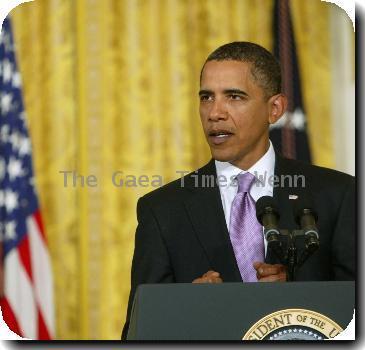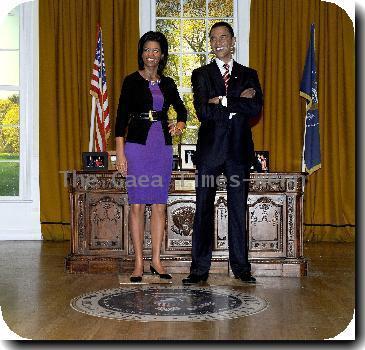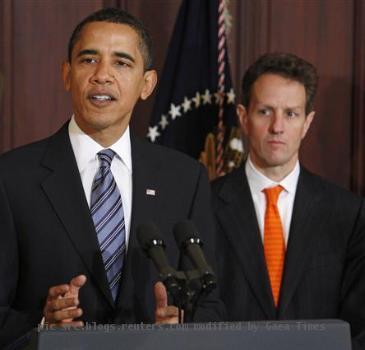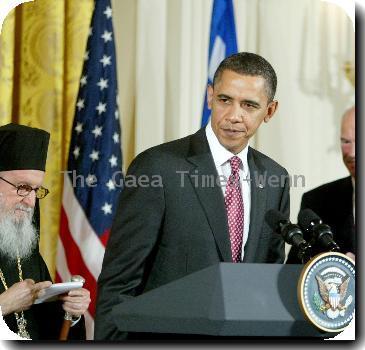AP source: Obama chooses Solicitor General Elena Kagan for Supreme Court; announcement Monday
By Ben Feller, APMonday, May 10, 2010
AP source: Elena Kagan picked for Supreme Court
WASHINGTON — Solicitor General Elena Kagan will be nominated Monday to the Supreme Court by President Barack Obama, pushing the former law school dean toward the pinnacle of her profession and positioning the United States to have three women justices for the first time in its history.
Obama will announce his choice at 10 a.m. in the East Room of the White House alongside Vice President Joe Biden. Kagan will also speak. The room will be filled with Kagan’s Justice Department colleagues and other guests invited to soak in one of a presidency’s biggest moments.
The White House revealed Kagan’s name Monday morning after it had been reported Sunday night.
Obama has started making calls to Senate leaders to inform them of his choice, while his White House team is launching a broad campaign-style outreach to Capitol Hill and the media. That effort is designed to shape the national image of Kagan, an unknown figure to much of America.
The selection of Kagan came after nearly a monthlong process of consideration. Obama always had Kagan on his short list but still considered a broader group of candidates, interviewing four.
The president informed Kagan that she would a Supreme Court nominee on Sunday night. He then called the three federal judges he did not choose for the position, Diane Wood, Merrick Garland and Sidney Thomas.
Never a judge, Kagan is known as sharp and politically savvy and has enjoyed a blazing legal career. She was the first female dean of Harvard Law School, first woman to serve as the top Supreme Court lawyer for any administration, and now first in Obama’s mind to succeed legendary liberal Justice John Paul Stevens.
On Monday morning, shortly before 8 a.m., Kagan emerged from her Washington, D.C., apartment, got into the back seat of a vehicle and was driven to the White House. She did not acknowledge photographers and reporters who had gathered to await her appearance.
At 50 years old, Kagan would be the youngest justice on the court, which would give her the opportunity to extend Obama’s legacy for a generation.
Kagan must first win Senate confirmation. A source close to the selection process said a central element in Obama’s choice was Kagan’s reputation for bringing together people of competing views and earning their respect.
Republicans have shown no signs in advance that they would try to prevent a vote on Kagan, but they are certain to grill her in confirmation hearings over her experience, her thin record of legal writings and her objections to the military’s policy about gays.
When she was confirmed as solicitor general in 2009, seven Republicans backed her: Sens. Tom Coburn of Oklahoma, Susan Collins of Maine, Judd Gregg of New Hampshire, Orrin Hatch of Utah, Jon Kyl of Arizona, Richard Lugar of Indiana and Olympia Snowe of Maine.
Kagan came to the fore as a candidate who had worked closely with all three branches of government, a legal mind with both a sense of modesty and sense of humor. The source spoke on condition of anonymity to discuss factors that led to Kagan’s impending nomination.
Kagan has clerked for Thurgood Marshall, worked for Bill Clinton and earned a stellar reputation as a student, teacher and manager of the elite academic world. Her standing has risen in Obama’s eyes as his government’s lawyer before the high court over the last year.
Yet Kagan would be the first justice without judicial experience in almost 40 years. The last two were William H. Rehnquist and Lewis F. Powell Jr., both of whom joined the court in 1972.
All of the three other finalists she beat out for the job are federal appeals court judges, and all nine of the current justices served on the federal bench before being elevated.
Kagan’s fate will be up to a Senate dominated by Democrats, who with 59 votes have more than enough to confirm her, even though they are one shy of being able to halt any Republican stalling effort.
For the second straight summer, the nation can expected an intense Supreme Court confirmation debate even though, barring a surprise, Kagan is likely to emerge as a justice.
Supreme Court justices wield enormous power over the daily life of Americans. Any one of them can cast the deciding vote on matters of life and death, individual freedoms and government power. Presidents serve four-year terms; justices have tenure for life.
Democrats went 15 years without a Supreme Court appointment until Obama chose federal appellate judge Sonia Sotomayor last year to succeed retiring Justice David Souter. Just 16 months in office, Obama has a second opportunity with Kagan, under different circumstances.
Obama’s decision last year centered much on the compelling narrative of Sotomayor, the first Hispanic Supreme Court justice, who grew up in a housing project and overcame hardship.
This year, Obama particularly wanted someone who could provide leadership and help sway fellow justices toward a majority opinion. The president has grown vocal in his concern that the conservative-tilting court is giving too little voice to average people.
Kagan is known for having won over liberal and conservative faculty at the difficult-to-unite Harvard Law School, where she served as dean for nearly six years.
Her background, including time as a lawyer and a key domestic policy aide in President Clinton’s White House, would give the court a different perspective.
The White House is expected to frame Kagan’s lack of service as a judge in upbeat terms, underscoring that there are many qualified routes to the top of the judiciary.
Kagan, who is unmarried, was born in New York City. She holds a bachelor’s degree from Princeton, a master’s degree from Oxford and a law degree from Harvard.
She served as a Supreme Court clerk for one of her legal heroes, Justice Thurgood Marshall. And before that, she clerked for federal appeals court judge Abner Mikva, who later became an important political mentor to Obama in Chicago.
Kagan and Obama both taught at the University of Chicago Law School in the early 1990s.
In her current job, Kagan represents the U.S. government and defends acts of Congress before the Supreme Court and decides when to appeal lower court rulings.
Kagan has the high task of following Stevens, who leaves a legacy that includes the preservation of abortion rights, protection of consumer rights and limits on the death penalty and executive power. He used his seniority and his smarts to form majority votes.
Rick Garnett, a professor of law and associate dean of University of Notre Dame Law School, voiced the concern of many conservatives.
“Future elections might undo some of the president’s policies, but his more liberal views about the Constitution, the powers of the national government, and the role of unelected federal judges, are now being locked in securely,” Garnett said in a statement.
Kagan would be the fourth woman to serve on the Supreme Court, following current Justices Ruth Bader Ginsburg and Sonia Sotomayor and retired Justice Sandra Day O’Connor.
She would be the third Jewish justice along with six Catholics. With Stevens’ retirement, the court will have no Protestants, the most prevalent denomination in the United States.
__
Associated Press reporter Natasha T. Metzler contributed to this story.
Tags: Barack Obama, Bill Clinton, District Of Columbia, Judicial Appointments And Nominations, Law Schools, Legislature Hearings, North America, School Administration, Solicitor general, United States, Washington











